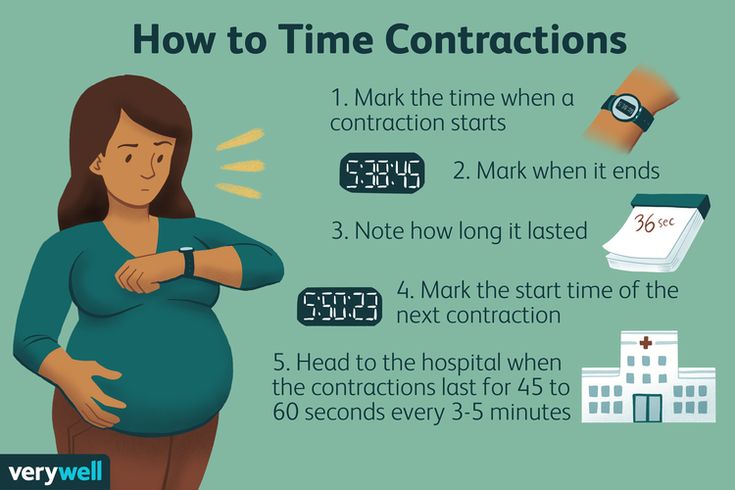Is it ok not to gain weight during pregnancy
How much is too much and too little weight gain during pregnancy
How much is too much and too little weight gain during pregnancy
Everyone knows eating a healthy and balanced diet helps the baby get adequate and appropriate nutrients that are needed for baby’s growth at a healthy rate. But what most pregnant women do not know is how many extra calories do they really need? Many times they are told to “eat for two”!! However, this usual age old advise of ''eat for two'' is a myth and medically incorrect.
The average pregnant woman needs only about 300 healthy additional calories. This will help them gain the right amount of weight during pregnancy. So, the question many women have in their minds is what is right amount of weight gain during pregnancy? How much is too much? How much is too little?
Here are some facts:
During the first trimester of pregnancy tiny fetuses have very tiny nutritional needs. There is no need to gain any weight at all and it is perfectly normal. In fact, some women may even lose a few pounds because of morning sickness that is usually okay, as long as weight gain in later part of pregnancy is appropriate.
However, the same is not true when we talk about weight gain in second trimester. As the baby gets bigger, demand for calories and nutrients increases and to keep up with that increased demand, there is a need for steady weight gain. There comes that question again-How much is normal gain, how much is too much and how much is too little weight gain?
The amount of weight a woman gains during pregnancy depends on several factors which include:
- Pre-pregnancy body mass index (BMI)
- Number of Fetuse
- Physical activity levels
- Nutritional habits
By the second trimester, weight gain aim for women with different BMI weight ranges should be as follows:
(1 pound= approximately 450 grams)
- Underweight (BMI under 18.5) before pregnancy: About 1 pound per week (28 to 40 total pounds total during pregnancy)
- Normal BMI (18.
 5 to 24.9) before pregnancy: Less than 1 pound per week (25 to 35 pounds total during pregnancy)
5 to 24.9) before pregnancy: Less than 1 pound per week (25 to 35 pounds total during pregnancy) - Overweight (BMI 25 to 29.9) before pregnancy: About 0.6 pounds per week (15 to 25 pounds total during pregnancy)
- Obese (BMI 30 or more) before pregnancy: About 0.5 pounds per week (11 to 20 pounds total during pregnancy)
If the woman is carrying twins, she needs to gain roughly 50 percent more weight (again depending on her pre-pregnancy weight). It's especially important to gain the right amount of weight when you're expecting twins because your weight affects the babies' weight. And because twins are often born before the due date, a higher birth weight is important for their health. When carrying twins, you may need between 3,000 and 3,500 calories a day.
Where does the extra weight go during Pregnancy?
- Baby: 8 pounds (approximately)
- Placenta: 2-3 pounds
- Amniotic fluid: 2-3 pounds
- Breast tissue: 2-3 pounds
- Increased Blood supply: 4 pounds
- Stored fat for delivery and breastfeeding: 5-9 pounds
- Larger uterus: 2-5 pounds
- Total: 25-35 pounds
How to ensure that you gain the right amount of weight during Pregnancy?
Following are the tips to gain right amount of weight instead of gaining too little or too much:
- Eat five to six small meals every day.
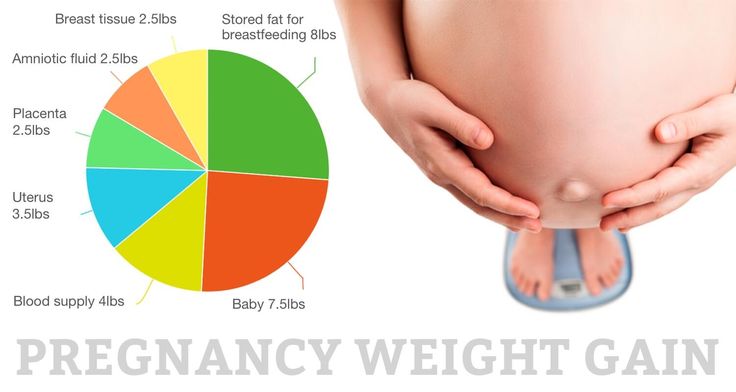
- Keep quick, easy snacks handy, such as nuts, raisins, cheese and crackers, dried fruit, and ice cream or yogurt.
- Spread peanut butter on toast, crackers, apples, bananas, or celery. One tablespoon of creamy peanut butter gives you about 100 calories and 7 grams of protein.
- Add nonfat powdered milk to mashed potatoes, scrambled eggs, and hot cereal.
- Add extras to your meal, such as butter or margarine, cream cheese, gravy, sour cream, and cheese.
What if you gain too much weight during Pregnancy?
Gaining too much weight can dramatically increase your risk of gestational diabetes. It also may pose several risks for your baby in the form of having bigger babies with increased risk of operative delivery, babies with breathing problems and children who later in life are overweight and/or develop diabetes.
If you have gained more weight than recommended, it is wise to talk to the obstetrician about it.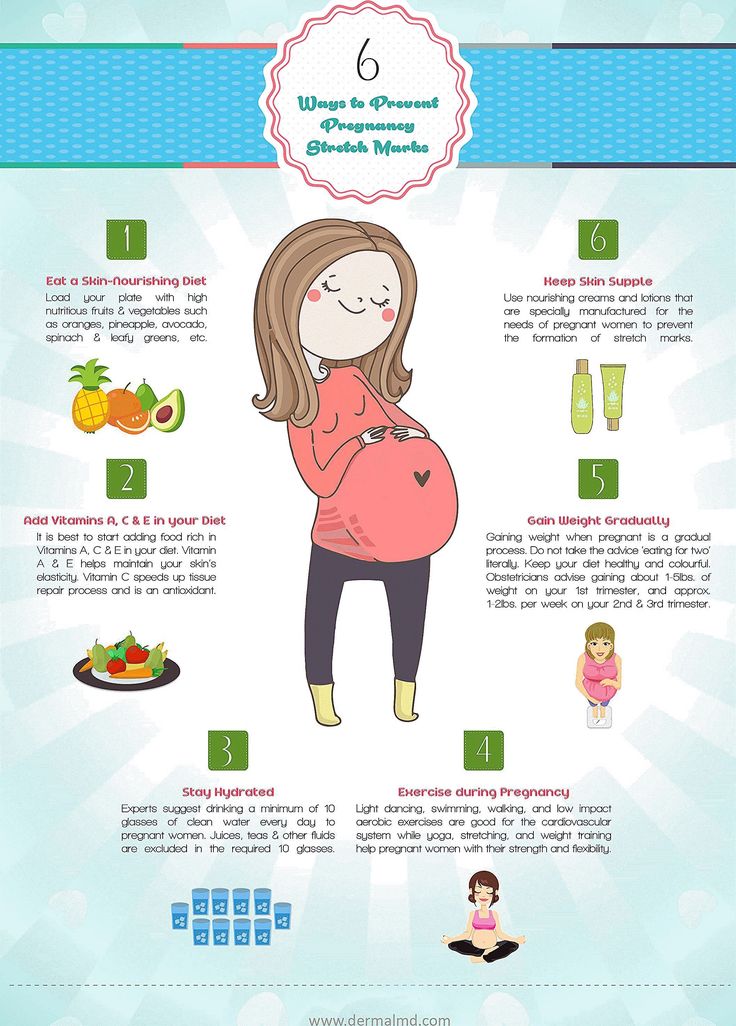 In most cases, it is worthwhile to wait until after delivery to lose weight. However below are some tips to slow down the weight gain:
In most cases, it is worthwhile to wait until after delivery to lose weight. However below are some tips to slow down the weight gain:
- When eating fast food, choose lower-fat items such as broiled chicken breast sandwich with tomato and lettuce (no sauce or mayonnaise), side salad with low-fat dressing, plain bagels, or a plain baked potato. Avoid foods such as French fries, mozzarella sticks, or breaded chicken patties.
- Avoid whole milk products. You need at least four servings of milk products every day. However, using skim, 1%, or 2% milk will greatly reduce the number of calories and fat you eat. Also, choose low-fat or fat-free cheese or yogurt.
- Limit sweet or sugary drinks. Sweetened drinks such as soft drinks, fruit punch, fruit drinks, iced tea, lemonade, or powdered drink mixes have lots of empty calories. Choose water, club soda, or mineral water to skip extra calories.
- Don't add salt to foods when cooking. Salt causes you to retain water.
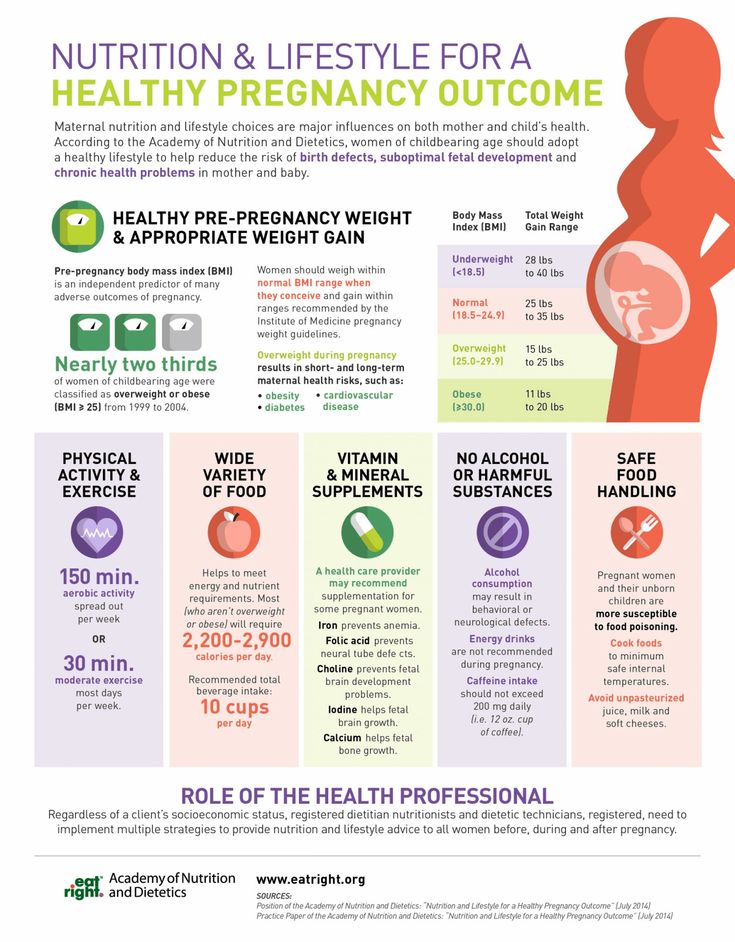
- Limit sweets and high-calorie snacks. Cookies, candies, donuts, cakes, syrup, honey, and potato chips have a lot of calories and little nutrition. Try not to eat these foods every day. Instead, try fresh fruit, low-fat yogurt, strawberries, or pretzels as lower-calorie snack and dessert choices.
- Use fats in moderation. Fats include cooking oils, margarine, butter, gravy, sauces, mayonnaise, regular salad dressings, sauces, lard, sour cream, and cream cheese. Try lower-fat alternatives.
- Cook food the healthy way. Frying foods in oil or butter will add calories and fat. Baking, broiling, grilling, and boiling are healthier preparation methods.
- Exercise. Moderate exercise can help burn excess calories. Walking or swimming is usually safe for pregnant women. The obstetrician can suggest what exercise would be right for you before getting started.
What are the reasons for a woman not gaining weight during pregnancy?
For most women, pregnancy weight gain comes easily.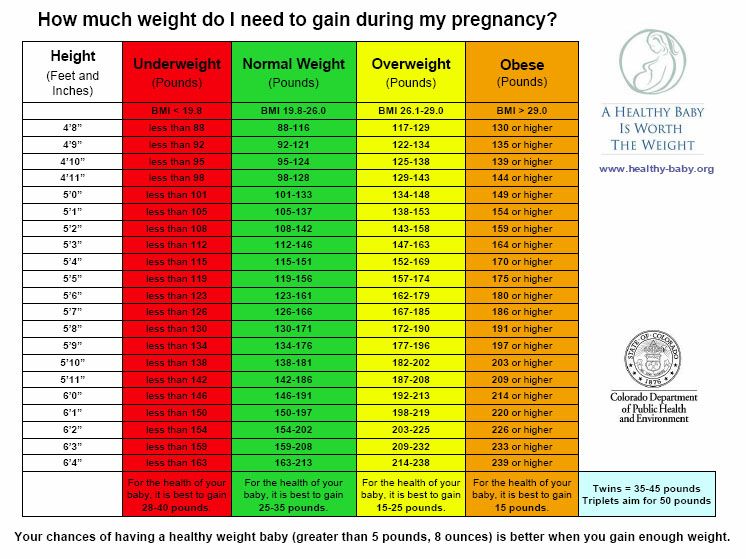 But for some the problem isn’t gaining too much weight – on the contrary it’s not gaining enough. Here is how to get your pregnancy weight gain on track, and when it is time to seek medical advice.
But for some the problem isn’t gaining too much weight – on the contrary it’s not gaining enough. Here is how to get your pregnancy weight gain on track, and when it is time to seek medical advice.
A number of factors can contribute to not gaining enough weight when a woman is pregnant. Causes of slow or no weight gain in pregnancy includes
- A fast metabolism
- Morning sickness
- Loss of Appetite
- Concerns over body image
- Other medical reasons
What happens if there is not enough gain in weight during pregnancy?
Not gaining enough weight over the course of pregnancy can put the woman and her baby at greater risk of complications. Babies whose mothers gain too little weight during pregnancy are more likely to:
- Be born prematurely
- Be small for their gestational age
- Suffer growth restriction in the uterus
Some babies who are born small may have trouble breastfeeding and be at greater risk for illnesses and having delayed developmental milestones.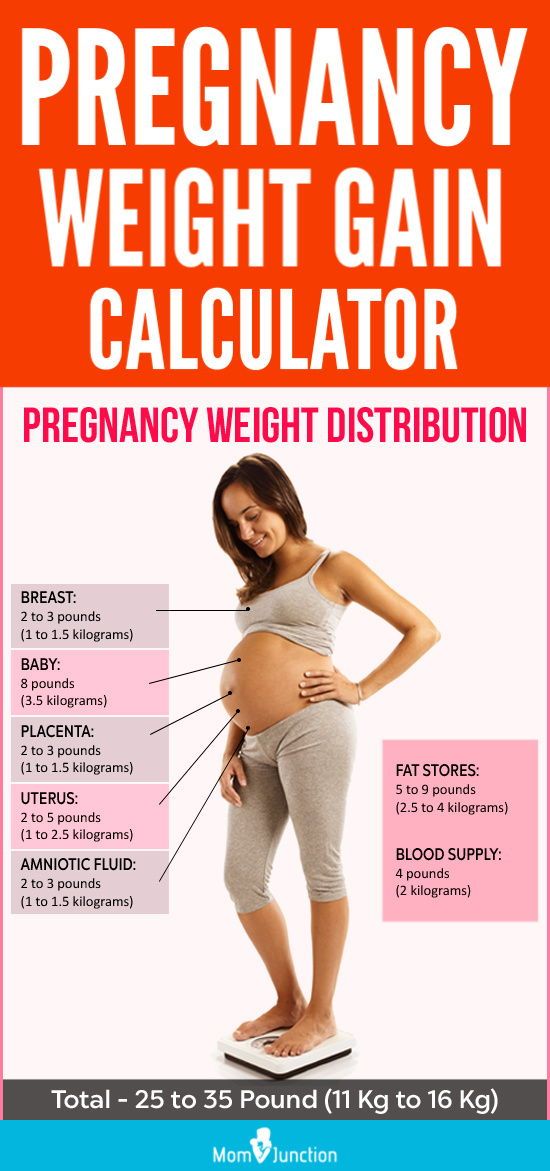
How to gain more weight during pregnancy?
It sounds obvious, but it's worth repeating. If you're eating the recommended calories during pregnancy and you're not gaining weight fast enough, you should eat more.
It’s easier said than done but try not to stress if you’re not gaining the advised weight. Your doctor or a registered dietitian can help create a meal plan for you.
Here are a few tips to help you put on more weight during pregnancy:
- Choose nutrient-dense foods
If you’ve lost your appetite, focus on high-quality calories in small packages filled with healthy fats, protein and fiber. Nutrient-rich options include:
Avocados, Nuts and nut butter, Fatty fish (like salmon), Olive oil, Beans , Peas, Whole grain bread, cereal and pasta, Oatmeal, Brown rice , Lean meat or poultry, Plain Greek yogurt, Dried fruit, Eggs, Cheese.
- Add a caloric punch to your dishes.
Try dosing your dishes with an extra tablespoon of calorie-dense olive oil, butter, cream cheese, sour cream or cheese. Or toss a couple of scoops of powdered milk in hot cereal or scrambled eggs.
Or toss a couple of scoops of powdered milk in hot cereal or scrambled eggs.
- Adding protein supplements to your meals can help you gain weight. Talk to your doctor to make sure you get the right amount.
- Eat strategically.
It’s important to drink plenty of water during pregnancy to stay hydrated. Fruits and vegetables are a staple of a healthy pregnancy diet. They provide your baby with folic acid, a vitamin that helps form healthy cells and reduces the risk of birth defects like spina bifida.
That said, both beverages and calorie-light dishes can put a damper on your appetite. Instead of starting your meal with a salad or big glass of water, save the beverages and greens for after your main course.
- Don’t turn to junk foods.
While it might be tempting to fill the caloric gap with doughnuts, try to resist the urge. Processed, sugary or greasy foods will add weight but not nutrition. Right now, you and your baby need both.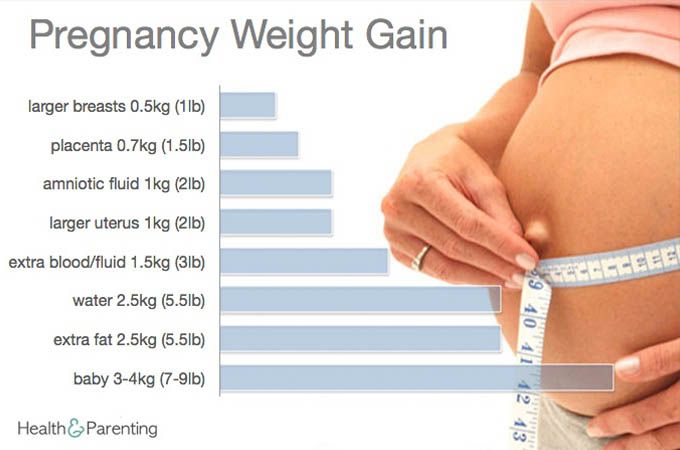
Try not to skip meals, even if you’re feeling nauseous. Instead of eating three large meals a day, try having six smaller snack-sized bites every two hours or so. Eating smaller, frequent meals also helps combat morning sickness.
If you don't feel like eating, make yourself a thick smoothie and add wheat germ to make it nutritious.
- Compensate for exercise-
Have a regular exercise routine. Exercise during pregnancy is excellent for your health and your baby’s in most cases. Just be sure to check in with your obstetrician on your fitness program and make sure you’re eating enough to hit your caloric goals.
To make up for a sweat session, eat a nutrient-dense snack around the time you exercise. It’s especially important if your workout involves high-intensity exercise or lasts longer than 45 minutes.
Sometimes, severe and continuous nausea and vomiting can keep you from gaining weight during pregnancy. If you’re among the 1 to 3 percent of women who develop hyperemesis gravidarum, your baby may not be getting the vital nutrients and vitamins he needs to grow.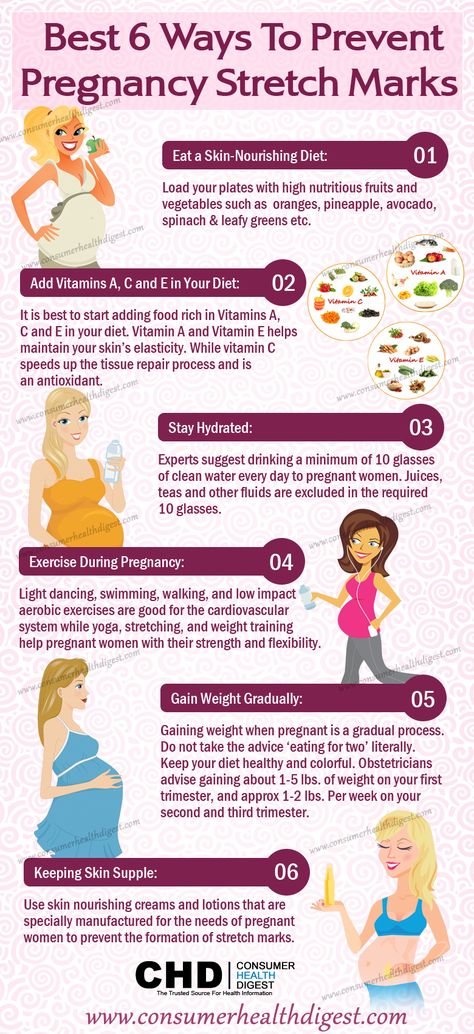 You may also be dehydrated, which can be a problem for both you and your baby.
You may also be dehydrated, which can be a problem for both you and your baby.
Be sure to let your doctor know if your morning sickness is severe. Signs of hyperemesis gravidarum include not being able to keep food or liquids down and losing weight. Your practitioner may prescribe lifestyle changes or medication to help you manage the condition.
Finally, if you’ve struggled with an eating disorder in the past, it can be challenging to accept pregnancy weight gain. Speak honestly with your practitioner about past or present disordered eating. He or she may recommend seeing a registered dietitian with expertise in eating disorders for extra guidance. Building a supportive team can make it easier to ask for help when you need it. Remember that gaining weight is essential for your baby’s growth and health.
Remember the Mantra: Everything in Moderation-Be it calorie intake, food choices, weight gain and exercise. This will ensure optimum pregnancy outcome.
When you need to gain more weight during pregnancy: MedlinePlus Medical Encyclopedia
Most women should gain somewhere between 25 and 35 pounds (11 and 16 kilograms) during pregnancy. If a woman does not gain enough weight, there may be health problems for the mother and baby.
Most women will gain 2 to 4 pounds (1 to 2 kilograms) during the first trimester, and 1 pound (0.5 kilogram) a week for the rest of the pregnancy. Through the entire pregnancy:
- Overweight women need to gain less (15 to 20 pounds or 7 to 9 kilograms or less, depending on their prepregnancy weight).
- Underweight women will need to gain more (28 to 40 pounds or 13 to 18 kilograms).
- You should gain more weight if you are having more than one baby. Women having twins will need to gain 37 to 54 pounds (17 to 24 kilograms).
Some women have a hard time gaining weight during pregnancy. Sometimes, it is because they start a pregnancy underweight, or they have other health issues that keep them from gaining weight. Sometimes, they are not able to keep food down due to nausea and vomiting.
Sometimes, they are not able to keep food down due to nausea and vomiting.
Either way, a balanced, nutrient-rich diet, along with moderate exercise, is the basis for a healthy pregnancy. Ask your health care provider how many calories you should eat each day, and how you can gain the right amount of weight.
If your provider says you should gain more weight, here are some tips to help:
- Do not skip meals. Instead of eating 3 big meals, eat 5 to 6 small meals every day.
- Keep quick, easy snacks on hand. Nuts, raisins, cheese and crackers, dried fruit, and ice cream or yogurt are good choices.
- Spread peanut butter on toast, crackers, apples, bananas, or celery. One tablespoon (16 grams) of creamy peanut butter will provide about 100 calories and 3.5 grams of protein.
- Add nonfat powdered milk to foods such as mashed potatoes, scrambled eggs, and hot cereal.
- Add butter or margarine, cream cheese, gravy, sour cream, and cheese to your meals.
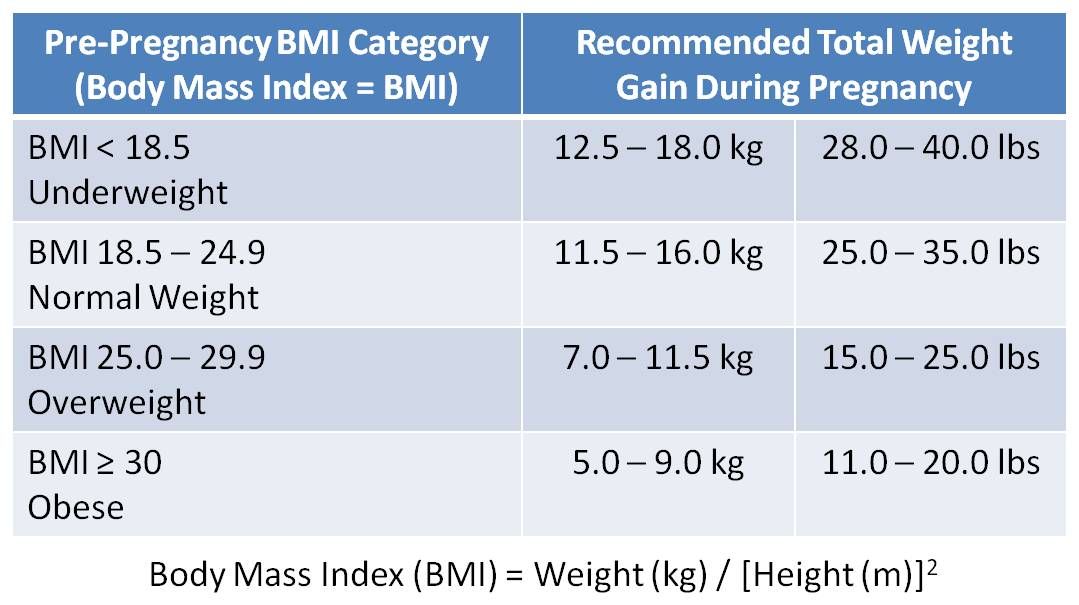
- Try to eat more foods that are high in good fats, such as nuts, fatty fish, avocados, and olive oil.
- Drink juices made from real fruit that are high in vitamin C or beta carotene. Grapefruit juice, orange juice, papaya nectar, apricot nectar, and carrot juice are good choices.
- Avoid junk food.
- Ask your provider about taking prenatal vitamins and other supplements.
- See a dietitian or nutritionist for help with your diet, if your provider recommends it.
If you have struggled with your weight in the past, it may be hard to accept that it is OK to gain weight now. It is normal to feel anxious as the numbers on the scale edge up.
Pregnancy is not a time to diet or worry about weight gain. Keep in mind that weight gain is needed for a healthy pregnancy. The extra weight will come off after you have had your baby. Remember not to gain too much, as this can cause your baby to be too big. A healthy diet and regular exercise will help you have a healthy pregnancy and baby.
If worries about your body image affect your pregnancy or daily life, talk to your provider.
Berger DS, West EH. Nutrition during pregnancy. In: Landon MB, Galan HL, Jauniaux ERM, et al, eds. Gabbe's Obstetrics: Normal and Problem Pregnancies. 8th ed. Philadelphia, PA: Elsevier; 2021:chap 6.
Bodnar LM, Himes KP. Maternal nutrition. In: Resnik R, Lockwood CJ, Moore TR, Greene MF, Copel JA, Silver RM, eds. Creasy and Resnik's Maternal-Fetal Medicine: Principles and Practice. 8th ed. Philadelphia, PA: Elsevier; 2019:chap 12.
Updated by: John D. Jacobson, MD, Professor of Obstetrics and Gynecology, Loma Linda University School of Medicine, Loma Linda Center for Fertility, Loma Linda, CA. Also reviewed by David Zieve, MD, MHA, Medical Director, Brenda Conaway, Editorial Director, and the A.D.A.M. Editorial team.
Browse the Encyclopedia
Weight category - articles from the specialists of the clinic "Mother and Child"
— What norms of weight gain during pregnancy are doctors guided by today?
- The average increase for all nine months is from 9 to 14 kg.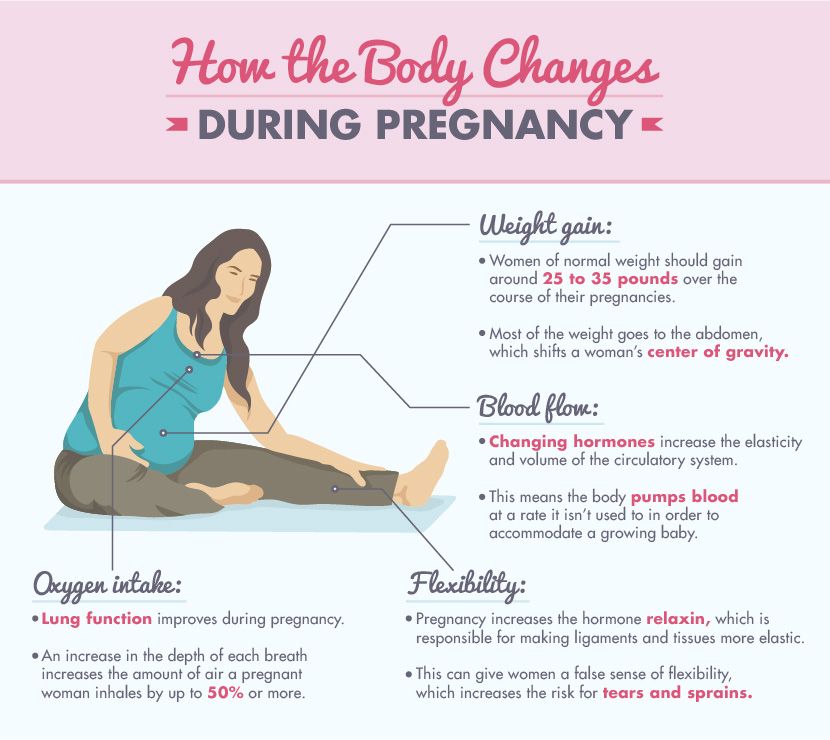 The exact figure depends on many factors, but a sharp deviation in one direction or the other from the norm should be alarming. To calculate the allowable increase, the initial weight of the expectant mother should be taken into account: for example, women of a fragile physique (asthenic type) must gain more than initially obese women. In addition, it is important to consider the trimester of pregnancy. nine0005
The exact figure depends on many factors, but a sharp deviation in one direction or the other from the norm should be alarming. To calculate the allowable increase, the initial weight of the expectant mother should be taken into account: for example, women of a fragile physique (asthenic type) must gain more than initially obese women. In addition, it is important to consider the trimester of pregnancy. nine0005
— How does weight change in different trimesters?
- Weight gain throughout pregnancy is uneven: at the very beginning it is almost imperceptible, increases significantly towards the middle and may begin to decrease two weeks before delivery. In the first trimester, both weight gain and weight loss are considered normal. On average, during this period, the expectant mother is gaining from 1.5 to 2.5 kg. In the second trimester, the baby begins to grow actively and the numbers will be different: about 500 g per week for thin women, no more than 450 g for pregnant women with normal weight and no more than 300 g for full ones.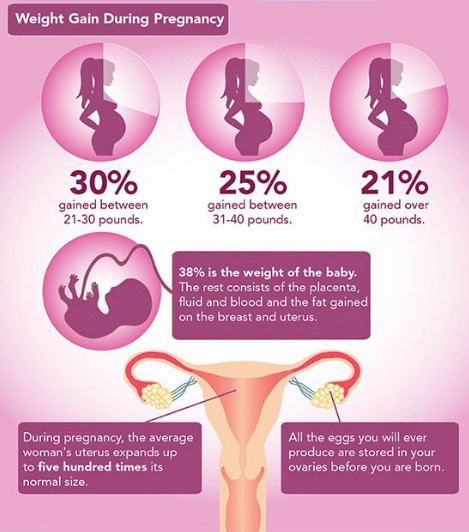 In the third trimester, the weight of the expectant mother should not increase by more than 300 g per week.
In the third trimester, the weight of the expectant mother should not increase by more than 300 g per week.
— Why do pregnant women gain weight?
- Contrary to popular belief, weight gain is not only due to the mass of a growing baby and body fat - they make up about half of the total figure. For nine months, a woman's uterus increases, the volume of circulating blood and intercellular fluid increases, amniotic fluid and the placenta form.
— Why is excess weight dangerous?
- Rapid weight gain is typical for multiple pregnancies, underweight women and too young mothers whose bodies are still developing. Often it is the result of normal overeating and requires adjustment of the diet. Diets and fasting days (especially the so-called "hungry") during the period of bearing a child are strictly prohibited even if the pregnant woman is overweight. It is very important to ensure that the baby receives all the nutrients, vitamins and trace elements, so you just need to balance your diet accordingly.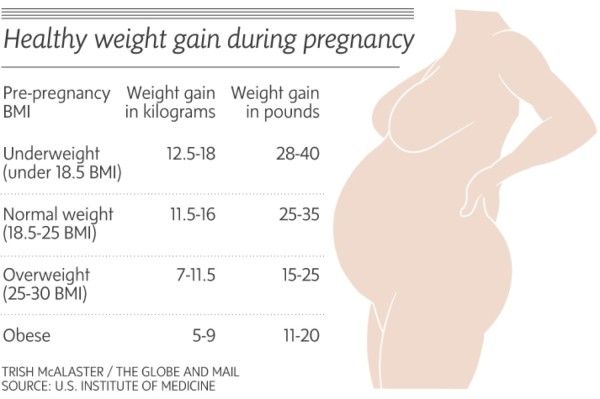 nine0005
nine0005
Excess weight may occur due to fluid retention, which manifests itself in the form of edema. By the way, this is especially true for working pregnant women: sedentary work provokes stagnation of fluid in the lower extremities and pathological weight gain. In this case, wearing compression stockings, leg exercises and regular walking is recommended.
— Is slow weight gain dangerous, on the contrary?
- Some expectant mothers gain the first kilograms only after the 14th week - usually for petite women who do not have a genetic predisposition to be overweight or women suffering from toxicosis. In the first case, weight gains slowly throughout all nine months, which, if the pregnant woman feels normal, should not cause concern. If we talk about early toxicosis, then by the second trimester the malaise usually disappears, body weight returns to normal and weight gain goes on as usual. nine0005
Weight during pregnancy. What increase is considered optimal?
Why is excessive weight gain during pregnancy particularly harmful? What should be the calorie content of the diet? How to build your diet so that you can eat varied (and tasty), but at the same time not gain too much? Let's figure it out.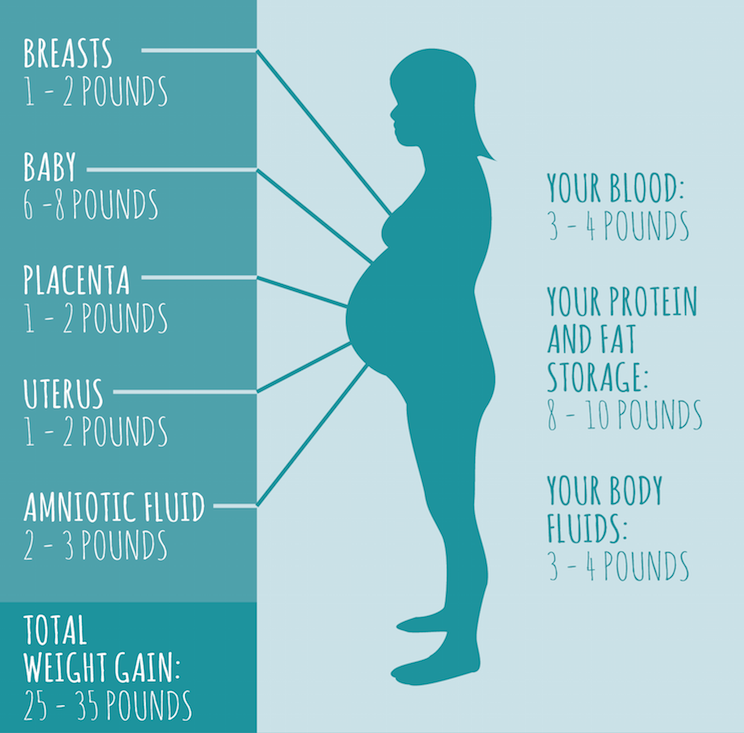
What makes up weight gain during pregnancy?
An increase in the subcutaneous fat layer during pregnancy is a normal and natural process.
While the baby is growing inside you, he needs energy and external protection. But during pregnancy, weight increases not only and not so much due to the adipose tissue of the mother: there is more fluid in the body, the uterus grows, the fetus and placenta develop, and the breasts increase in preparation for the feeding process.
Interestingly, weight loss during the period of toxicosis can later provoke its increase: the body will try to regain what was lost.
Expectant mothers especially actively gain weight in the second trimester and the beginning of the third, but closer to childbirth, a pregnant woman can even lose 1-2 kilograms. nine0005
As long as the weight increases more or less evenly and does not go beyond the upper limit of the norm, there is nothing to worry about. But if your weight is rapidly going up, you should be wary.
How to correctly calculate the weight, and what increase is considered optimal?
In Russian obstetric practice, it is generally accepted that the total gain should not exceed 12 kg. for the entire pregnancy. Of these 12 kg. 5-6 accounts for the fetus, placenta, amniotic fluid, another 1.5-2 - for an increase in the uterus and mammary glands, and only 3-3.5 - for the fat mass of a woman. nine0005
But this is a general indicator, a kind of "average temperature in the hospital." The optimal increase is calculated individually and depends on the initial weight of the pregnant woman, her age, the number of fetuses and the size of the child (children), physical activity.
WHO recommends that optimal weight gain be calculated based on Body Mass Index (BMI).
It is determined by the formula: body weight (kg) / height squared (m).
| BMI | Recommended weight gain |
|---|---|
19.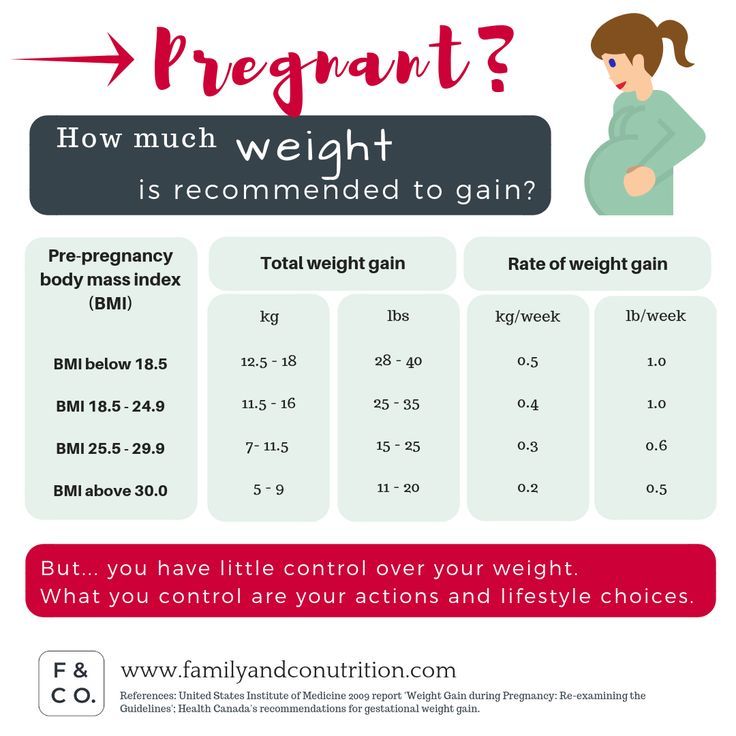 8-26 (normal body weight) 8-26 (normal body weight) | 12.5-15 kg |
| 26.1-29 (overweight) | 11.5 - 14 kg |
| over 29 (obese) | 7-9 kg |
How to calculate the optimal weight gain?
To do this, use the following chart:
- Calculate your BMI: divide your initial weight in kg. for height in meters squared. nine0106
For example, your “pre-pregnancy” weight was 60 kg with a height of 170 cm.
BMI = 60: (170 x 170) = 20.76.
- A BMI less than 18.5 indicates underweight. Indicators from 18.5 to 25 are within the norm, from 25 to 30 are above the norm, and a figure greater than 30 indicates obesity.
- Now that you know your BMI, find the optimal weekly increase in the table and compare it with yours.
| Week of pregnancy | Underweight before pregnancy (BMI less than 18.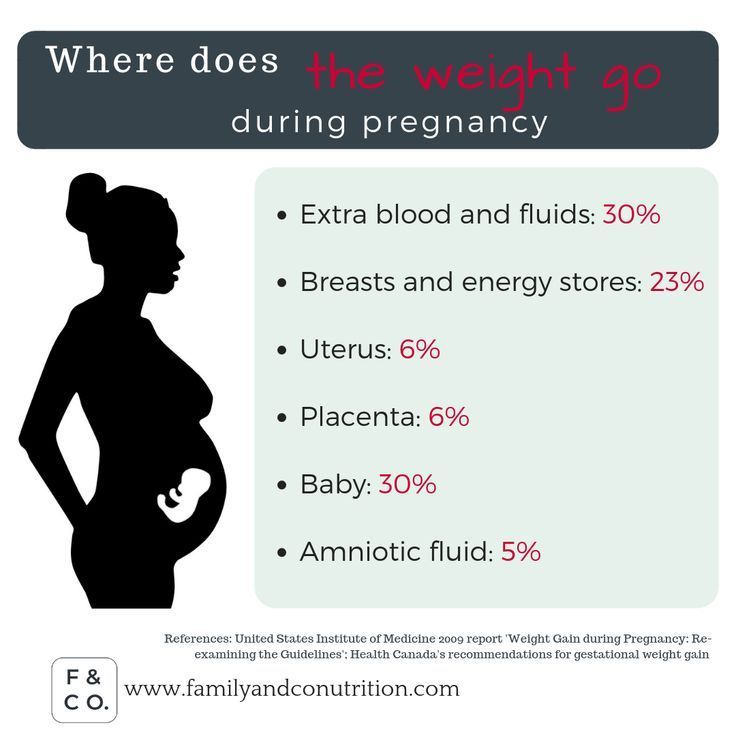 5) 5) | Normal pre-pregnancy weight (BMI 18.5 to 24.9) | Overweight before pregnancy (BMI over 30) |
|---|---|---|---|
| 4 | 0-0.9 kg | 0-0.7 kg | 0-0.5 kg |
| 6 | 0-1.4 kg | 0-1 kg | 0-0.6 kg |
| 8 | 0-1.6 kg | 0-1.2 kg | 0-0.7 kg |
| 10 | 0-1.8 kg | 0-1.3 kg | 0-0.8 kg |
| 12 | 0-2 kg | 0-1.5 kg | 0-1 kg |
| 14 | 0.5-2.7 kg | 0.5-2 kg | 0.5-1.2 kg |
| 16 | up to 3.6 kg | up to 3 kg | up to 1.4 kg |
| 18 | up to 4.6 kg | up to 4 kg | up to 2.3 kg | nine0073
| 20 | up to 6 kg | up to 5.9 kg | up to 2.9 kg |
| 22 | up to 7.2 kg | up to 7 kg | up to 3.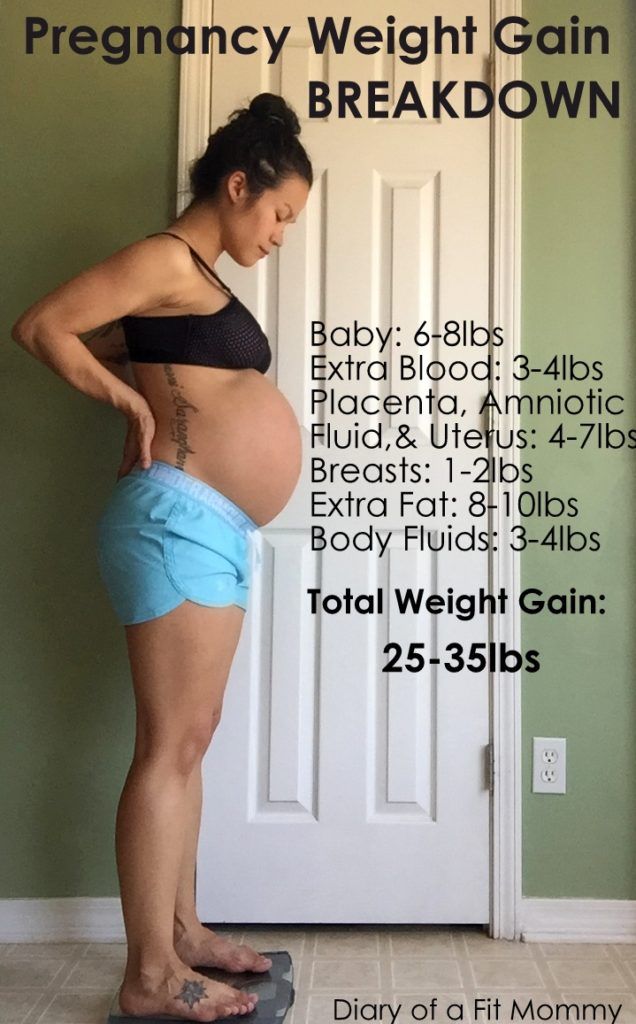 4 kg 4 kg |
| 24 | up to 8.6 kg | up to 8.5 kg | up to 3.9 kg |
| 26 | up to 10 kg | up to 10 kg | up to 5 kg |
| 28 | up to 13 kg | up to 11 kg | up to 5.4 kg |
| 30 | up to 14 kg | up to 12 kg | up to 5.9 kg |
| 32 | up to 15 kg | up to 13 kg | up to 6.4 kg |
| 34 | up to 16 kg | up to 14 kg | up to 7.3 kg |
| 36 | up to 17 kg | up to 15 kg | up to 7.9 kg |
| 38 | up to 18 kg | up to 16 kg | up to 8.6 kg |
| 40 | up to 18 kg | up to 16 kg | up to 9.1 kg |
Recently, doctors are increasingly talking about an individual approach and urge not to panic if the increase is slightly beyond the normal range.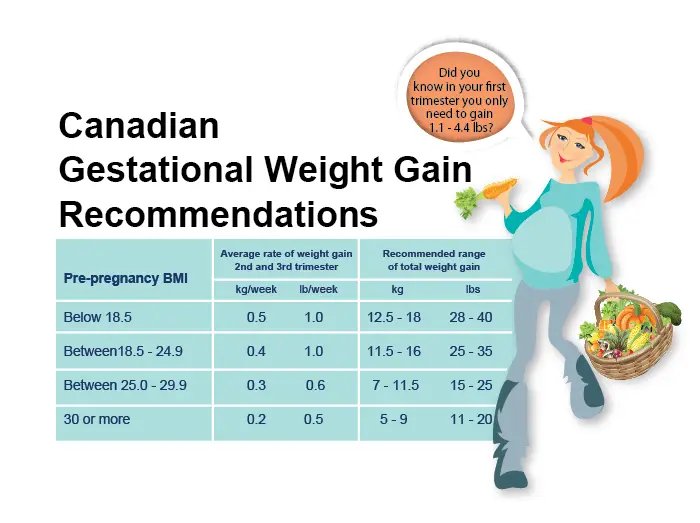 When assessing the state of health of a pregnant woman, the doctor focuses not only on weight, but also takes into account the results of tests and examinations and other important indicators.
When assessing the state of health of a pregnant woman, the doctor focuses not only on weight, but also takes into account the results of tests and examinations and other important indicators.
Why is excessive weight gain dangerous?
Gaining extra pounds can lead to gestational diabetes, hypertension, preeclampsia, or cause a caesarean section.
In addition, excessive weight gain during pregnancy may increase the risk of obesity and associated cardiovascular disease.
What can I do to keep my weight within normal limits during pregnancy?
First of all, consult a nutritionist. If there is no such doctor in the antenatal clinic, it makes sense to contact a specialist on a commercial basis. He will develop an individual diet, which will contain all the useful elements, and will offer to keep a food diary. It will also tell you how to eat right and weigh yourself. nine0037 To prevent excessive weight gain during pregnancy, it is enough to follow simple rules of a healthy diet:
- Eat often and in small portions;
- Always keep a “healthy snack” on hand: fresh apple wedges, unsweetened crackers, dried fruit, or sugar-free yogurt;
- Refuse soda, chips, sausages and sausages;
- Minimize sweets;
- Avoid fast food;
- Limit the use of condiments, especially salt, which retains water in the body; nine0106
- Choose steamed dishes;
- Eat more fiber-rich foods such as whole grain bread, bran, vegetables;
The diet of a pregnant woman should be varied. Include grains, vegetables, fruits, dairy products, meat and fish, legumes, or nuts.
Include grains, vegetables, fruits, dairy products, meat and fish, legumes, or nuts.
It must be remembered that expectant mothers should never starve and adhere to extreme diets.
How many calories per day do you need during pregnancy? nine0040
It is difficult to calculate the energy value per day on your own, and then strictly adhere to a certain number of calories, and it is not necessary, unless it is recommended by a nutritionist or endocrinologist. On average, you can aim for 2000-2500 calories per day, but it is important to understand that the need for calories depends on many factors: age, initial weight, health status and level of physical activity.
When should I be on the alert?
Strictly speaking, it is better for a pregnant woman not to worry and entrust her condition to a doctor who will monitor the development of pregnancy, analyzes and monitor weight. It is important to take tests to determine the level of fasting blood glucose once a trimester.



